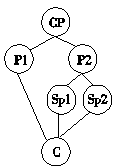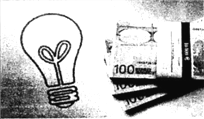题目内容
【题目】阅读理解
The Loss of Innocence
Innocence is such a precious gift. It's explained as freedom from guilt or wrong doing. Just imagine never having to worry about anything and having a guilt free mind. Some people wish to save this kind of innocence from being lost from childhood to adulthood.
What would the world be like if innocence were never lost? One way it would benefit humanity is the lack of hatred (仇恨)among the world. During youth, there may be an occasional argument, even a little physical fight, but nothing like firing a handgun at a fellow human being. And children are blind towards the racial differences of others. A kid will hang out with any other kid. It is the lack of innocence and the ignorance we learn from adults that influence children otherwise. Another benefit is the constant desire for fun and adventure. With very little if any time at all for fun,the adventurous mind is lost in time with the responsibilities placed upon adults. If innocence were kept alive, these ambitions would never depart from our lives.
However, other people actually hate the idea of innocence lasting forever. They feel that the lack of organization and mental power of those with innocence would cause extremely destructive consequences to society in general. A large number of individuals would never have the urge to learn, work, and act upon the necessary needs for humanity to survive. Without a proper education which is usually provided by those who no longer live in a world of innocence, people would not have the desire to succeed, get a good job in life, or provide income for their families, which would hurt the lives of children.
The lack of a good education and career would also harm the economy. As long as innocence is kept alive, no one would be terribly angered at the lack of effort people put out in the workplace, resulting in a strong decline in production and quality of needed goods.
Maybe it is wrong in wanting to save innocence. It sure is a nice thought, though. Perhaps innocence was meant to be lost. It was God's will to make things the way they are, and there is a good purpose for everything. All that remains to be said about innocence is to enjoy it while it lasts.
(1)The author believes that the loss of innocence in adulthood should be _____.
A.avoided
B.ignored
C.accepted
D.encouraged
(2)Lifelong innocence would be beneficial to society in that _____.
A.proper education would be provided
B.there would be no racial discrimination
C.more happy families would be guaranteed
D.people would realize their childhood dreams
(3)According to the author, people with innocence can hurt the economy with their lack of _____.
A.motivational will
B.mental ability
C.adventurous ambitions
D.needed goods
(4)Which of the following shows the structure of the passage?
CP: Central Point P: Point Sp: Sub-point (次要点) C: Conclusion
A.
B.
C.
D.
【答案】
(1)C
(2)B
(3)A
(4)A
【解析】本文是一篇议论文,讲述了拥有纯真以及失去纯真的好处与坏处。
(1)考查细节理解。根据最后一段中的”Perhaps innocence was meant to be lost.“可知作者对于成年后童真的缺失是接受的,认为这是正常的过程。故选C。
(2)考查推理判断。根据第二段 中的”One way it would benefit humanity is the lack of hatred (仇恨)among the world. And children are blind towards the racial differences of others.“可知童真可以让世界远离仇恨。孩子们对他人没有种族歧视,如果人一生都有童真的,人类就不会有种族歧视,故选B。
(3)考查推理判断。根据第三段中的”A large number of individuals would never have the urge to learn, work, and act upon the necessary needs for humanity to survive.“;以及第四段中的”As long as innocence is kept alive, no one would be terribly angry at the lack of effort people put out in the workplace, resulting in a strong decline(减少) in production and quality of needed goods.“可知如何人们一直都保有纯真,会失去进步的动力。故选A。
(4)考查文章结构。根据倒数第二段中的”The lack of a good education and career would also harm the economy“可知没有好的教育和生涯,会对经济发展有害,人们没有上进心就会使社会失去发展动力。故选A.这篇文章对innocence进行了辩论,列举了innocence如果一直存在带来的两方面的好处,然后又论证了不利的方面,所以逻辑结构符合A选项。

 天天向上一本好卷系列答案
天天向上一本好卷系列答案 小学生10分钟应用题系列答案
小学生10分钟应用题系列答案


